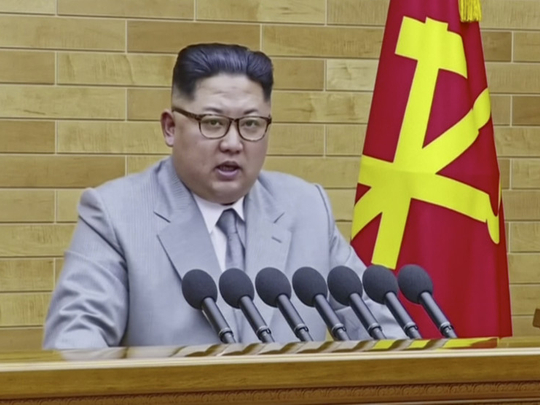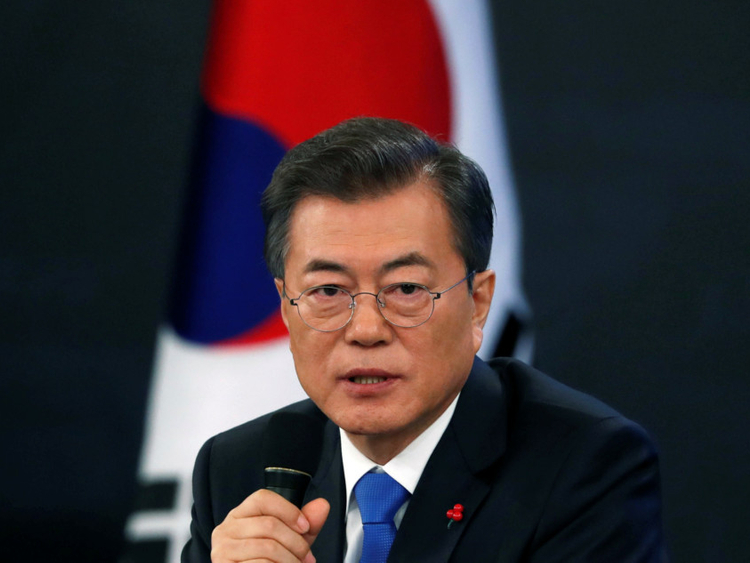
After months of gathering storm clouds, there’s a rare ray of sunshine on the Korean Peninsula. Recently North and South Korea successfully held high-level talks, offering the first chance for Kim Jong-un and Moon Jae-in — the leaders of the North and South, respectively — to get the measure of each other. Moon and Kim are very different men — one an ardent democrat, the other 30 years his junior, third in a line of dictators. But the two men are also a peculiar reflection of each other: Two leaders who faced daunting challenges in their early stages in power yet defied expectations and found political success. Their challenge will now be to craft a deal that can clear the impasse created by North Korea’s continued nuclear and ballistic provocations. That should be possible if both men appreciate the sizeable political capital that each can leverage in such negotiations.
Perhaps it is not entirely appropriate to refer to Kim’s rule as a “success” — he presides, after all, over a brutal and murderous dictatorship. But in terms of consolidating power domestically while projecting strength internationally, it is more than fair to say Kim has achieved much. When his father, Kim Jong-il, died in 2011, the younger Kim, not yet 28, was a virtual unknown. But Kim soon proved to be just as brutal as his father and grandfather. He reinvigorated his country’s oppressive domestic surveillance, which caused the number of North Koreans escaping the country to plummet by nearly two-thirds.
Externally, Kim oversaw North Korea’s development of intercontinental ballistic missiles and atomic weaponry, a stunning achievement that was long considered impossible for such an impoverished country. Combining bellicose rhetoric and weapons testing, such as the August 2017 threat to fire a missile near Guam, Kim has managed to put himself at the top of the list of foreign-policy challenges for the United States — and won for his country a powerful negotiating position for talks.
Kim’s successful purges may complicate the practical aspects of dialogue. Among those killed were the intermediaries that North Korea had previously relied upon to speak with South — such as the late Jang, who even visited Seoul in 2002 during the high point of the inter-Korean relations.
On the other side of the demilitarised zone (DMZ) is Moon Jae-in, whose first eight months as South Korea’s President have been an improbable success. Coming into the Blue House in May, Moon faced a seemingly fragile domestic situation. Partisanship was still inflamed after his predecessor, Park Geun-hye, was impeached and removed from office following a bizarre corruption scandal involving Park’s spiritual adviser and, among other things, dressage horses.
Meanwhile, following the deployment of the United States-made Thaad missile defence system, China had imposed economic sanctions that cost the South Korean economy billions of dollars. Across the Pacific Ocean, South Korea’s most important ally — the US — elected President Donald Trump, who repeatedly complained about the cost of stationing troops in and trading with South Korea. The conservative press in South Korea sniped at the liberal Moon, criticising him for poor handling of the US-South Korea alliance at a time when North Korea was causing a global crisis.
Moon handled all this with aplomb. All of Moon’s meetings with Trump have concluded on positive notes, most notably Trump’s Seoul visit last November. Moon also normalised relations with China with remarkable alacrity. After Moon’s state visit to Beijing last month, South Korea and China jointly declared the “four principles for peace”, namely: No war in the Korean Peninsula; no nuclear weapons in the Korean Peninsula; peaceful resolution of all issues, including denuclearisation of North Korea, through dialogue and negotiations; and commitment to improved inter-Korean relations. With his diplomatic successes, coupled with a strong domestic showing in expanding welfare programmes and raising the minimum wage, Moon’s approval rating in the most recent poll is a sky-high 77 per cent, making him the most popular leader in the free world.
With skilful manoeuvring, Moon has put South Korea in an advantageous position as it begins talks with North Korea. Despite the fears about Trump’s perceived hawkishness against North Korea, Trump welcomed the inter-Korean talks, as he said in his recent phone conversation with Moon: “America supports President Moon 100 per cent.” In addition to resuming normal diplomatic relations with China, Moon did much to win the hearts and minds of the Chinese people, who are beginning to wonder why China needs to continue its troublesome alliance with North Korea. Moon’s low-key breakfast at a regular restaurant in Beijing earned high marks on Chinese social media, prompting the Beijing restaurant to introduce the “Moon Jae-in combo”.
A closer look at Moon’s actual responses to the provocations puts to rest the notion that he has been soft on North Korea. When North Korea tested a long-range missile last July, Seoul responded with a “decapitation” missile drill designed to show Kim that his leadership would be eliminated if he deployed his arsenal. When North Korea fired an intermediate-range missile over Japan in last August, Seoul responded with a bomber drill with bunker busters, making the same point as before. In September, Moon and Trump agreed to amend the guidelines preventing South Korea from developing its own ballistic missiles beyond a certain pay load — meaning South Korean missiles will be able to penetrate and destroy North Korea’s underground facilities.
The offers that were made at last week’s talks were small, involving North Korea’s participation in the Pyeongchang Winter Olympics in exchange for the limited relaxation of sanctions to enable such participation. Neither side is yet willing to leverage its political capital to offer major concessions that can end the nuclear crisis. So any major breakthrough, at least in this first round, appears unlikely. But regardless of how favourable a situation Moon creates for South Korea, he cannot possibly risk a nuclear war in the Korean Peninsula — and if Kim is concerned for his own survival, avoidance of a war constrains his choices, too. In the long run, therein will lie the possibility for peace.
— Washington Post
S. Nathan Park is a columnist, academic and attorney based in Washington.










